News
Lambda Legal honors Dylan Mulvaney, George Takei at West Coast Liberty Awards

The nation’s top LGBTQ legal organization, celebrated transgender activist Dylan Mulvaney and actor George Takei at its West Coast Liberty Awards on Thursday night, raising nearly $300,000 for the organization’s litigation and public policy work.
About 200 supporters gathered at The Lot at Formosa in West Hollywood for the ceremony, hosted by comedian Dana Goldberg, who has helped raise more than $50 million for nonprofits supporting LGBTQ+ rights, marriage equality, abortion access, and HIV/AIDS education.
Lambda Legal’s CEO, Kevin Jennings, opened the evening with a sobering look at the current landscape for LGBTQ+ rights. “A wave of anti-LGBTQ+ hate is sweeping this country, and everything we have fought for over the past 51 years is now at risk,” Jennings warned, sharing statistics on the surge in discriminatory legislation—from 267 bills in 2022 to 530 in 2024, with dozens passed into law each year.
Lambda can claim numerous victories over its 51 years, including successfully fighting against sodomy laws and for same-sex marriage all the way to the U.S. Supreme Court.
And just this week, the group announced that the U.S. Supreme Court had granted a request for a divided argument in challenge to Tennessee’s transgender youth health care ban. The case that will be argued by a partner attorney, Chase Strangio, Co-Director for Transgender Justice with ACLU’s LGBT & HIV Project. Strangio will be the first trans man to argue before the U.S. Supreme Court.

Honoree Dylan Mulvaney, 27, who rose to prominence documenting her gender transition on TikTok through her “Days of Girlhood” series, addressed the ongoing challenges facing the transgender community. “I’ve learned that there is no acceptable version of transness because trans people are still not widely accepted,” she said. “Lambda Legal is not only an example of queer connection, but it is a direct response to the far right’s obsession with making our lives a living hell.”
Sheila Kuehl, California’s first openly gay state legislator, presented Takei’s award with a moving tribute to his family’s internment camp experience during World War II. “From Santa Anita to Arkansas, then back to California and Tule Lake,” Kuehl said, “George’s family experienced the worst of internment, only to return to a home that no longer existed.”
Kuehl detailed the family’s post-war struggles: “After the war was over and everyone was released, they went back to what they thought would be their home. But there was nothing left; there was no money, there was no home, there was no business.”
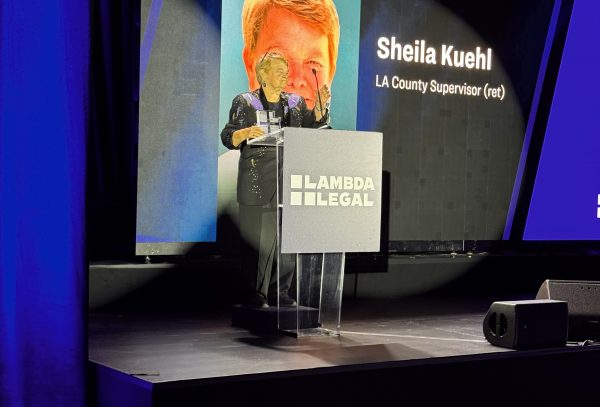
As the nation grapples with the possibility of immigration detention camps for migrants, as promised by Donald Trump, Takei’s story stands as a reminder of the human cost when civil rights are destroyed in the name of xenophobia and hyperbole.
Takei, 86, best known for his role as Lieutenant Sulu in “Star Trek,” came out as gay in 2005 and married his husband, Brad Altman, in 2008. “Receiving the Liberty Award from Lambda Legal is deeply humbling,” Takei said. “This honor represents the legacy of so many extraordinary fighters… As we gather here for the West Coast Liberty Awards, it’s a reminder of how far we’ve come, but in the turbulence of this election cycle, we know how much further we have to go.”
The evening featured a performance by pop singer David Archuleta, with entertainment figures including Vince Rossi, Grant Knoche, Arisce Wanzer, Danny Pintauro, and Sizzy Rocket walking the blue carpet in support.

Past West Coast Liberty Awards honorees include Sally Field, Sheryl Lee Ralph, Margaret Cho, Alan Cumming, Kathy Griffin, Bill Jones, Dolores Huerta, Judith Light, California Gov. Gavin Newsom, Rosie O’Donnell, and Herb Ritts.
Founded in 1973, Lambda Legal remains the nation’s leading legal organization focused on LGBTQ+ civil rights, fighting discrimination through litigation, education, and public policy work. As legislative threats escalate, the organization’s mission remains clear: Lambda Legal continues to defend the right of LGBTQ+ people to live authentically and thrive without fear.
Arts & Entertainment
2025 Best of LGBTQ LA Finalist Voting
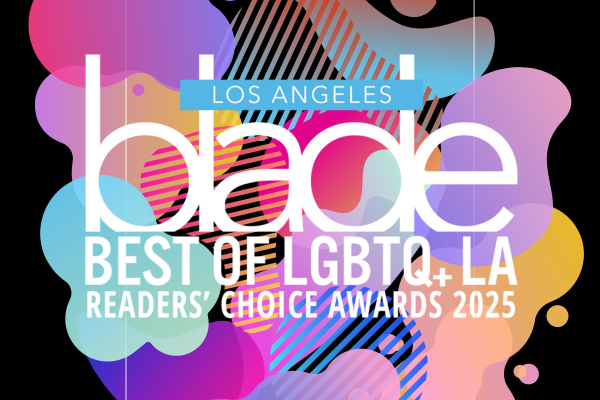
The 2025 Los Angeles Blade Best of LGBTQ LA Awards are here! You submitted your nominations—now it’s time to vote for the finalists. Voting is open through May 2, 2025.
Among some of your favorite categories are Best Drag Performer, Local Influencer of the Year, Best Happy Hour, Go-Go of the Year, Activist of the Year, Public Official of the Year, Best Musical Artist, Best Non-Profit, Best Bartender, Best DJ, Best Local Podcast, and so many more!
Winners will be revealed at the Best of LGBTQ LA celebration on Thursday, May 22 at The Abbey. Stay tuned for more party details coming soon!
Vote using the form below or by clicking HERE.
Local
‘Housing Now!’: Advocates plan to wrap City Hall in red tape
Advocates demand local government removes the red tape on housing resources

On Tuesday at 8 a.m., over 100 housing advocates from the AIDS Healthcare Foundation (AHF), Housing Is A Human Right (HHR) and the Los Angeles office of the National Coalition for the Homeless, will join together for a national day of action to demand “Housing Now” for the homeless community nationwide.
Housing advocates will gather in front of City Hall to wrap the entire perimeter of City Hall in red tape.
The ‘Stop the Red Tape Protest’ marks the first anniversary of when the Supreme Court of the United States ‘Grants Pass’ oral arguments. The Grants Pass decision in 2024 made it so that cities like Grants Pass and other ‘localities may impose criminal penalties for acts like public camping and public sleeping, without violating the Eighth Amendment — even if they lack sufficient available shelter space to accommodate their unhoused population.’
Since then, Grants Pass has been sued multiple times over ‘objectively unreasonable’ homeless ordinances that discriminate against people with disabilities.
“Seven people die on the streets of Los Angeles every day. Delays in bringing permanent housing online immediately through adaptive reuse and new construction are unconscionable,” said Susie Shannon, Policy Director for Housing is a Human Right. “The city response of breaking up encampments for the more than 45,000 people experiencing homelessness in the City of Los Angeles has led to individuals taking refuge in abandoned buildings and in places where services are scarce.”
A recent homeless count estimated that there around 45,000 homeless and unhoused Angelenos in the city.
According to AHF, the city is far behind in approving building permits and the creation of new and affordable housing units. The red tape and other bureaucratic issues were further exacerbated by the recent fires that affected large swaths of the city.

Pope Francis died on Monday at his official residence at the Vatican. He was 88.
Cardinal Kevin Farrell, the Vatican camerlengo, said Francis passed away at Casa Santa Marta at 7:35 a.m. local time (1:35 a.m. ET.)
“His entire life was dedicated to the service of the Lord and of his church,” said Farrell. “He taught us to live the values of the Gospel with fidelity, courage, and universal love, especially in favor of the poorest and most marginalized. With immense gratitude for his example as a true disciple of the Lord Jesus, we commend the soul of Pope Francis to the infinite merciful love of the one and triune God.”
Francis, a Jesuit who was previously known as Jorge Mario Bergoglio, was born in Buenos Aires to Italian immigrant parents in 1936. He became archbishop of the Argentine capital in 1998.

Pope John Paul II in 2001 appointed him cardinal. The College of Cardinals in 2013 elected Francis to succeed Pope Benedict XVI after he resigned.
Francis vehemently opposed Argentina’s marriage equality law that then-President Cristina Fernández de Kirchner signed in 2010. Francis as pope backed civil unions for gays and lesbians and in 2023 said priests can bless same-sex couples.
Francis in 2023 said laws that criminalize homosexuality are “unjust.” He appointed Robert McElroy, an LGBTQ+-friendly cardinal from San Diego, as the new archbishop of Washington.
The pontiff in 2015 met with a group of gay, transgender, and HIV-positive prisoners in the Italian city of Naples. A Vatican charity in 2020 gave money to a group of trans sex workers in Italy who were struggling to survive during the COVID-19 pandemic.
Francis last October met with a group of trans and intersex Catholics and LGBTQ+ allies at the Vatican. GLAAD President Sarah Kate Ellis and Juan Carlos Cruz, a gay Chilean man who is a clergy sex abuse survivor, are among those who also met with Francis during his papacy.
Church teachings on homosexuality and gender identity, however, did not change under his papacy.
“From the early months of his papacy when he uttered the now-iconic ‘Who am I to judge?’ in response to a question about accepting gay priests, through numerous affirming pastoral messages to individual LGBTQ+ people, to his support for civil unions, and his condemnation of criminalization laws, Pope Francis has changed the church irreversibly by allowing people to see how their Catholic faith requires acceptance and equality,” said Francis DeBernardo, executive director of New Ways Ministry, a Mount Rainier, Md., based LGBTQ+ Catholic advocacy organization, in a statement.
DignityUSA Executive Director Marianne Duddy-Burke met Francis in 2023.
The group in a statement acknowledged the pontiff’s “legacy on LGBTQ+ issues is complicated,” noting “even with the recognition of so many positive words and actions, church teachings and even some recent Vatican documents remain problematic.” DignityUSA President Meli Barber nevertheless praised Francis.
“We also recognize that Pope Francis has raised awareness of LGBTQ+ issues in our church in truly unprecedented ways,” said Barber. “He spoke about us using our own terms and made a point of being seen meeting with LGBTQ+ people frequently. This sent a message of recognition and inclusion we never experienced from the Vatican before.”
Pope’s legacy is ‘mixed’
Activists in Argentina and around the world also mourned Francis.
“We mourn his death and embrace the people who are suffering today because of his passing,” LGBT Federation of Argentina President María Rachid told the Washington Blade.
Dindi Tan, national president of LGBT Pilipinas in the Philippines, on her Facebook page wrote Francis “was unafraid to challenge age-old dogmas and to ‘rattle’ the cage.” Pedro Julio Serrano, president of the Puerto Rico LGBTQ+ Federation, said Francis was an “ally of equity, humanity and dignity of LGBTQ+ people, not only during his pontificate, but throughout his life.”
Peter Tatchell, a long-time LGBTQ+ activist from the U.K. who is director of the Peter Tatchell Foundation, in a statement acknowledged Francis’s “more compassionate tone towards sexual minorities” that includes blessings for same-sex couples. Tatchell, nevertheless, pointed out the Vatican under Francis’s papacy continued to oppose marriage equality and trans rights.
“The Catholic Church remains a force for discrimination and suffering,” said Tatchell. “Under his leadership, the Vatican continued to oppose same-sex marriage and trans rights. Catholic bishops lobbied against the decriminalization of homosexuality in many parts of the world. The Vatican still upholds the homophobic edicts of the Catechism, which denounces the sexual expression of same-sex love as a ‘grave depravity’ and ‘intrinsically disordered.’ Francis’s legacy is, therefore, a mixed one — offering some progress but leaving deep-rooted inequalities largely intact.”
Vance met with Francis on Easter Sunday
Francis earlier this year spent more than a month in a Rome hospital after he developed double pneumonia.

He met with Vice President JD Vance at the Vatican on Easter Sunday, hours before his death.
The pope had previously criticized the Trump-Vance administration over its immigration policies.
“I just learned of the passing of Pope Francis,” said Vance on X after the Vatican announced Francis’s death. “My heart goes out to the millions of Christians all over the world who loved him.”
I just learned of the passing of Pope Francis. My heart goes out to the millions of Christians all over the world who loved him.
I was happy to see him yesterday, though he was obviously very ill. But I’ll always remember him for the below homily he gave in the very early days…
— JD Vance (@JDVance) April 21, 2025
Argentine President Javier Milei, who previously criticized Francis, mourned him in a statement he posted to X. Milei also announced Argentina will observe seven days of mourning.
“It is with profound sorrow that I learned this sad morning that Pope Francis, Jorge Bergoglio, passed away today and is now resting in peace,” said Milei. “Despite differences that seem minor today, having been able to know him in his goodness and wisdom was a true honor for me.”
“As president, as an Argentine, and, fundamentally, as a man of faith, I bid farewell to the Holy Father and stand with all of us who meet today with this sad news,” he added.
ADIÓS
Con profundo dolor me entero esta triste mañana que el Papa Francisco, Jorge Bergoglio, falleció hoy y ya se encuentra descansando en paz. A pesar de diferencias que hoy resultan menores, haber podido conocerlo en su bondad y sabiduría fue un verdadero honor para mí.… pic.twitter.com/3dPPFoNWBr— Javier Milei (@JMilei) April 21, 2025
Features
New mayor Chelsea Byers, hopes to make WeHo a model city for others to follow
She has big plans, but can they withstand the Trump administration?

West Hollywood’s new mayor Chelsea Byers has lofty ambitions to make the 1.8-square-mile city, a model for other cities in the region.
She hopes to deal with compounding crises of housing affordability, traffic congestion, climate change and a new federal government that’s slashing programs and services many people – especially LGBTQ people – rely on.
But can Byers, who was elected to city council in November 2022 and selected as
mayor by council in January, really make a difference during her one-year stint in the
city’s top job?
Byers believe she can.
On one of the biggest challenges facing West Hollywood residents – housing
affordability – Byers fully embraces more housing development.
“For 80% of the city of West Hollywood including myself, who are renters, accessing a
home that is affordable is a very difficult thing. And the way that cities can address that
cost is frankly, by building more housing,” said Byers.
Byers also says she fully accepts the state’s regional housing needs assessment, which
assigned West Hollywood a target of building 3,933 new housing units in the next eight
years. That’s a tall order, given the city is currently only home to about 38,000 people.
“We’re going to have to look at this sort of invisible cap that we put across the town to
increase the capacity in a way that is equitable, that creates more opportunity for
different types of housing to be built. We wouldn’t want all of this rezoning to help us
lead to more one-bedroom apartments, when we know that the future of the city is also
accommodating more families,” said Byers, noting that queer families also struggle to find
homes in West Hollywood.
Those housing targets also dovetail with the city’s long-standing ambition to have
Metro’s K-Line extended through West Hollywood, Byers says.
But even if West Hollywood meets its targets, it’ll only be a small drop in region that
studies estimate needs to build more than 600,000 units of affordable housing. Still,
Byers says West Hollywood can lead by example and get buy-in from the other cities in
LA County to help solve the affordability crisis together.
“I believe that our values can be extended to these other places and help move them
actually in big ways,” said Byers.
Those values necessarily include West Hollywood’s historic diversity and inclusivity of
its LGBTQ+ and immigrant communities, both of which are feeling ill at ease from the
federal government’s attacks.
“I think it goes above and beyond the fear-mongering and outright assaults that the
current federal administration’s lobbying at the LGBTQ community. It’s the real
dismantling of funding and structures that existed at the federal level to enable a lot of
the social service programming that our LGBTQ community members rely on,” said Byers. “That is the biggest thing that we feel right now when I’m asked as a city leader,
how are we impacted?”
The city is responding to this looming threat through its own funding process.
“We’re at the start of a three-year cycle that determines how, which organizations, we
invest our $7.8 million social service budget. To have these two moments happening at
the same time gives the city a tremendous opportunity to step up to whatever extent we
can,” she said, noting that programs for sexual health care, HIV programs, and aging
in place are particular priorities.
“Part of what I’m doing is creating funding that is accessible and available in more rapid
ways than our three-year cycle. Because once the three-year cycle has closed its door,
then that is it. One of those tools is a micro grant program that is specifically dedicated
towards Innovative or programming that that is needed,” Byers said.
Part of the response is also ensuring that West Hollywood remains a beacon for LGBTQ
people not just in Los Angeles, but across the country and around the world.
“You’ll see us as the city not back down from our investment in programs like Pride
which are world-class events,” she said. “For us, this is the thing that matters. And
we’re willing to make the additional investments in the public safety resources to make
sure that it’s going to be a safe event.
“I think a lot of our community members have always felt like they are a target already,
and it hasn’t stopped anyone from doing their thing. In fact, if all eyes are watching, then
we better give them a good show, has been our attitude.”
Earlier this month, city council voted to officially designate the Santa Monica strip
between La Cienega and Doheny as the Rainbow District, with a dedicated budget to
improve and promote the area as a destination. The area will soon see new street pole, banners, utility wraps, murals, and the West Hollywood Trolley bus will have service
extended to Thursday nights to help promote business along the strip.
Byers says the city is also looking at reducing red tape around how business spaces are
licensed to help revitalize the area.
“We’ve often said that West Hollywood is a model for how it gets done,” said Byers. “It’s
such a beautiful moment for us to sort of pivot our focus locally and remind ourselves
that cities are about quality of life, and making sure that we can be an inclusive city.”
Congress
EXCLUSIVE: Garcia demands answers on deportation of gay Venezuelan asylum seeker
Congressman’s correspondence was shared exclusively with the Blade

U.S. Rep. Robert Garcia (D-Calif.) is demanding answers from the Trump-Vance administration on its deportation of Andry Hernández Romero, a gay Venezuelan makeup artist who was sent to a prison in El Salvador in violation of a federal court order and in the absence of credible evidence supporting the government’s claims about his affiliation with a criminal gang.
Copies of letters the congressman issued on Thursday to Immigration and Customs Enforcement and CoreCivic, a private prison contractor, were shared exclusively with the Los Angeles Blade.
Garcia noted that Hernández, who sought asylum from persecution in Venezuela over his sexual orientation and political beliefs, had entered the U.S. legally, passed a preliminary screening, and had no criminal record.
Pro-bono lawyers representing Hernández during his detention in the U.S. pending an outcome in his asylum case were informed that their client had been removed to El Salvador a week after he failed to show for a hearing on March 13.
Hernández’s family now fears for his safety while he remains in El Salvador’s Terrorism Confinement Center (CECOT), which has a well documented record of human rights abuses, Garcia said.
Additionally, the congressman wrote, while experts say Tren de Aragua does not use tattoos as identifiers, the “primary evidence” supporting Hernández’s deportation based on his supposed links to the transnational Venezuelan gang “appears to have been two crown tattoos labeled ‘Mom’ and ‘Dad,’ which are common cultural symbols in his hometown.”
The determination about his links to or membership in the organization was made by a CoreCivic employee whose criminal record and misconduct as a law enforcement officer led to his termination from the Milwaukee Police Department, Garcia wrote in his letter to the company.
Requesting a response by May 1, the congressman asked CoreCivic President Damon T. Hininger to address the following questions:
- What qualifications and training does CoreCivic require for employees tasked with making determinations about detainees’ affiliations?
- What protocols are in place to ensure that determinations of gang affiliation are based on credible and corroborated evidence?
- How does CoreCivic oversee and review the decisions made by its employees in such critical matters?
- What mechanisms exist to prevent and address potential misconduct?
- What is the nature of CoreCivic’s collaboration with ICE in making determinations that affect deportation decisions? Are there joint review processes?
- What background checks and ongoing assessments are conducted for employees involved in detainee evaluations, particularly those with prior law enforcement experience?
- What guidelines does CoreCivic follow regarding the use of tattoos as indicators of gang affiliation, and how does the company ensure that cultural or personal tattoos are not misinterpreted?
In his letter to Tae D. Johnson, acting director of ICE, Garcia requested answers to the following questions by May 1:
- Did ICE personnel independently review and approve the determination made by CoreCivic employee Charles Cross Jr. identifying Mr. Hernández Romero as a member of the Tren de Aragua gang?
- What evidence, beyond Mr. Hernández Romero’s tattoos, was used to substantiate the claim of gang affiliation?
- Under what legal authority are private contractors like CoreCivic permitted to make determinations that directly impact deportation decisions?
- What vetting processes and background checks are in place for contractors involved in such determinations? Are there oversight mechanisms to ensure their credibility and adherence to due process?
- What guidelines does ICE follow regarding the use of tattoos as indicators of gang affiliation, and how does the company ensure that cultural or personal tattoos are not misinterpreted?
Together with U.S. Rep. Maxwell Frost (D-Fla.), Garcia wrote to U.S. Rep. James Comer (R-Ky.) on Tuesday requesting permission to bring a congressional delegation to CECOT for purposes of conducting a welfare check on detainees, expressing specific concern for Hernández’s wellbeing. The congressmen said they would “gladly include any Republican Members of the committee who wish to participate.”
Hernández’s case has drawn fierce criticism of the Trump-Vance administration along with calls for his return to the U.S.
Influential podcaster and Trump ally Joe Rogan spoke out in late March, calling the deportation “horrific” and “a horrible mistake.”
Last week, California Gov. Gavin Newsom (D) sent a letter to Kristi Noem, secretary of the U.S. Homeland Security, which manages ICE, demanding Hernández’s immediate return and raising concerns with the right to due process amid the administration’s crackdown on illegal immigration.
Hernández “was denied the opportunity to defend himself against unsubstantiated allegations of gang involvement or to present his asylum claim,” the governor wrote. “We are not a nation that sends people to be tortured and victimized in a foreign prison for public relations victories.”
Immigrant Defenders Law Center President Lindsay Toczylowski, who is representing Hernández, has not been able to reach her client since his removal from the U.S., she told NBC News San Diego in a report published April 11.
“Under the Constitution, every single person has a right to due process, and that means they have a right to notification of any allegations the government is making against them and a right to go into court and prove that those allegations are wrong if that’s the case,” she said. “In Andry’s case, the government never gave us that opportunity. In fact, they didn’t even bring him to court, and they have forcefully sent him to El Salvador without ever giving us any notice or without telling us the way that we could appeal their decision.”
“CECOT, this prison where no one has ever left, where people are held incommunicado, is a very dangerous place for someone like Andry,” Toczylowski said.
In March, a DHS spokesperson posted on X that Hernández’s “own social media indicates he is a member of Tren de Aragua,” though they did not point to any specific posts and NBC reported that reviews of his known social media accounts turned up no evidence of gang activity.
During a visit to CECOT in March, Time Magazine photographer Philip Holsinger photographed Romero and reported that the detainee plead his innocence — “I’m not a gang member. I’m gay. I’m a stylist.” — crying for his mother as he was slapped and his head was shaved.
Brazil
US lists transgender Brazilian congresswoman’s gender as ‘male’ on visa
Erika Hilton has represented São Paulo since 2022

A transgender Brazilian congresswoman says the U.S. issued her a visa that listed her gender as “male.”
Erika Hilton on Wednesday wrote on her Instagram page that she requested a visa that would have allowed her to travel to the U.S. in order to participate in the Brazil Conference at Harvard University and the Massachusetts Institute of Technology.
The conference took place earlier this month.
“I was classified as ‘male’ by the U.S. government when I went to get my visa,” wrote Hilton, who added a visa she received from the U.S. in 2023 listed her gender as “female.”
Hilton is a Black travesti and former sex worker from São Paulo who won a seat in the Brazilian Congress in 2022. The Washington Blade spoke with Hilton shortly after her election.
“It is a big responsibility … but I feel very honored,” said Hilton. “I very much like to be able to be a representative for my people, and the more than 250,000 people who voted for me have confidence in me,” she said after she spoke at a rally in support of now Brazilian President Luiz Inácio Lula da Silva in a São Paulo square. “This demonstrates that our work has the potential to have a gigantic reach; where we can advance efforts to end death, poverty, misery, genocide that we have.”
President Donald Trump in his inaugural speech announced the federal government’s “official policy” is “there are only two genders, male and female.” The Trump-Vance administration has also banned the State Department from issuing passports with “X” gender markers.
Germany and Denmark are among the countries that have issued travel advisories for trans and nonbinary people who plan to visit the U.S. These warnings come ahead of WorldPride, which is scheduled to take place in D.C. from May 17-June 8.
Hilton said she is “not surprised” the U.S. issued her a visa with a male gender marker.
“I’m also not surprised by the level of hatred and fixation these people have with trans people,” she said. “After all, the documents I presented are rectified, and I’m registered as a woman, even on my birth certificate.”
Hilton further accused the U.S. of “ignoring official documents from other sovereign nations, even from a diplomatic representative.”
“At the end of the day, I’m a Brazilian citizen, and my rights are guaranteed and my existence is respected by our own constitution, legislation, and jurisprudence,” she said.
Editor’s note: Duda Salabert, another transgender Brazilian congresswoman, also said the U.S. listed her gender as “male” on her American visa.
National
Discredited former cop played ‘key role’ in deportation of gay make-up artist
Former police officer claimed that Andry Hernandez Romero was a member of Venezuelan gang ‘Tren de Aragua’

A new investigation points to a discredited, former police officer who played a “key role” in the wrongful deportation of Andry Hernández Romero, a gay asylum seeker and make-up artist who was sent to a prison in El Salvador under Trump’s Alien Enemies Act.
USA Today found in a recent investigation that the former Milwaukee police officer who filed the report about Hernández Romero, citing his tattoos as the reason for the alleged gang affiliation, has a long history of credibility and disciplinary issues in his former police officer position.
The private prison employee who previously worked as a police officer until he was fired for driving into a house while intoxicated—among other alcohol-related incidents—“helped seal the fate,” of Hernández Romero.
The investigation by USA Today found that the former police officer accused Hernández Romero of being a part of the Tren de Aragua gang because of Romero’s two crown tattoos with the words “mom,” and “dad,” which are now being identified as Venezuelan gang-related symbols.
Since then, his story has made headlines across the nation because Hernández Romero not only has no criminal record, but is legally seeking asylum in the U.S. due to credible threats of violence against him in Venezuela because of LGBTQ persecution.
He was targeted shortly after Trump invoked the Alien Enemies Act of 1798, which is a proclamation for all law enforcement officials to “apprehend, restrain, secure and remove every Alien Enemy described in section 1 of [the] proclamation.”
Charles Cross Jr., the former police officer, signed the report that wrongfully identified Hernández Romero as a gang member. Cross was fired in 2012 after many incidents relating to his credibility and how it was affecting the credibility of the Milwaukee Police Department to testify in court.
He had already been under investigation previously for claiming overtime pay that he never earned. In 2007, he had faced criminal charges for damage to property, according to court records.
In March, The Washington Blade spoke with the Immigrant Defenders Law Center Litigation and Advocacy Director Alvaro M. Huerta regarding the case who stated that “officials with U.S. Immigration and Customs Enforcement and U.S. Customs and Border Protection alleged his organization’s client was a member of Tren de Aragua, a Venezuela-based gang, because of his tattoos and no other information.”
Hernandez Romero came to the United States last year in search of asylum and now makes up one of 238 Venezuelan immigrants who were deported from the U.S. to El Salvador, Honduras and Venezuela. Many of those being deported are being sent to the Center for Terrorism Confinement, a maximum-security mega-prison in El Salvador, which has been accused of human rights violations.
According to the investigation, the Department of Homeland Security “wouldn’t offer further details on the case, or the process in general, but reiterated that the department uses more than just tattoos to determine gang allegiance.”
His story is now being looked at as a cautionary tale for the lack of due process the U.S. government is taking, as the Department of Homeland Security (DHS) and Immigration and Customs Enforcement (ICE) ramp up deportations across the nation.
Organizations like the Human Rights Campaign are now calling for Secretary of State Marco Rubio and Secretary of Homeland Security Kristi Noem to cease wrongful deportations and return Hernández Romero home. The petition also urges the U.S. government to afford all Americans, including nationals and asylum seekers residing in the U.S., due process of law as required by the Constitution.
California
South Park provides green space to a predominantly Latino community
‘…the need for green spaces within Latino communities has never been greater, especially in South L.A.

South Park, one of the oldest parks in Historic South Central, has brought multi-generational Angelenos together for centuries.
The park sits at the intersection of 51st Street and Avalon Blvd, surrounded by some of the most socially, culturally and historically important locations in the country, including Central Avenue, site of the West Coast jazz scene in in the 30s and 40s, the former Black Panther Party headquarters in L.A and one of the epicenters of the Watts rebellion in 1965.
The park—also known as Barry White Park—was founded in 1899. Today, 126 years later, the park still stands—hosting weekend soccer games, señoras chismeando, recreational activities like swimming, card games among elders and city-led events.
The park was named after two-time Grammy Award winner and R&B singer Barry White, who grew up in South Central, just blocks away from the park.
As PBS initially reported, the City of Los Angeles purchased it from a private developer for $10,000. At that time it was not as big as it is now, but was always characterized by its tall palm trees.
The park is located in Los Angeles City Council District 9, where the population is predominantly Latino (79.9%). According to Park Equity, Life Expectancy and Power Building research, the need for green spaces within Latino communities has never been greater, especially in South L.A, where the landscape is often characterized by an overconcentration of liquor stores and a lack of quality and accessible recreational spaces. More than a century after the park’s opening, for many local residents, it is one of the only parks within walking distance for them.
Amanda Walker, 56, moved to L.A. from Chicago, Illinois. She said one of her favorite things to do at the park is to take in the sun.
“The sun falls perfectly anywhere through the park, that’s probably my favorite part,” Walker said.
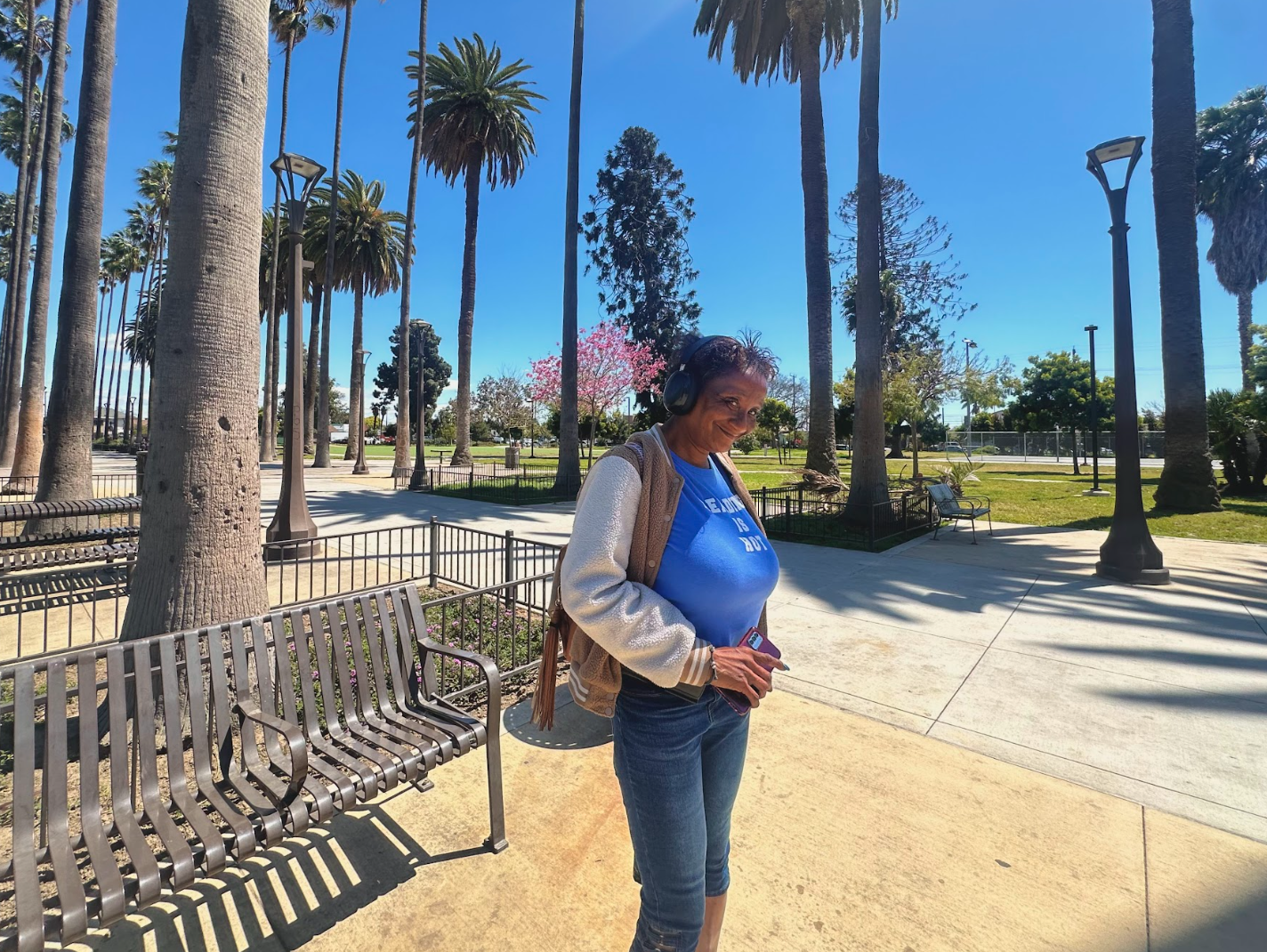
Amanda Walker at the park before meeting up with her friends. (Photo by Brenda Verano)
Walker said she loves coming to the park with her friends, who often use the park as a gathering place.
“I do wish there were more activities for adults,” she said. “The park has a playground for kids, and basketball courts… we need more things in the park for people like me.”
Maria L., 30, said she also comes to the park to be surrounded by nature. Although she lives in South Central, she said she does not have much free time to come as often as she would like.
“I haven’t been here in about eight months,” she said. Although she was alone, she was on a video call with her family where she was able to show them the scenery of the park and said she was surprised at how green and vibrant it all looked.
“I like coming here to just sit and hang out,” she said. She enjoys the sense of community she feels when being in the park. “Some people are walking their dogs; others are exercising or simply just laying down. It’s nice. I also like seeing the birds and the squirrels,” she said.
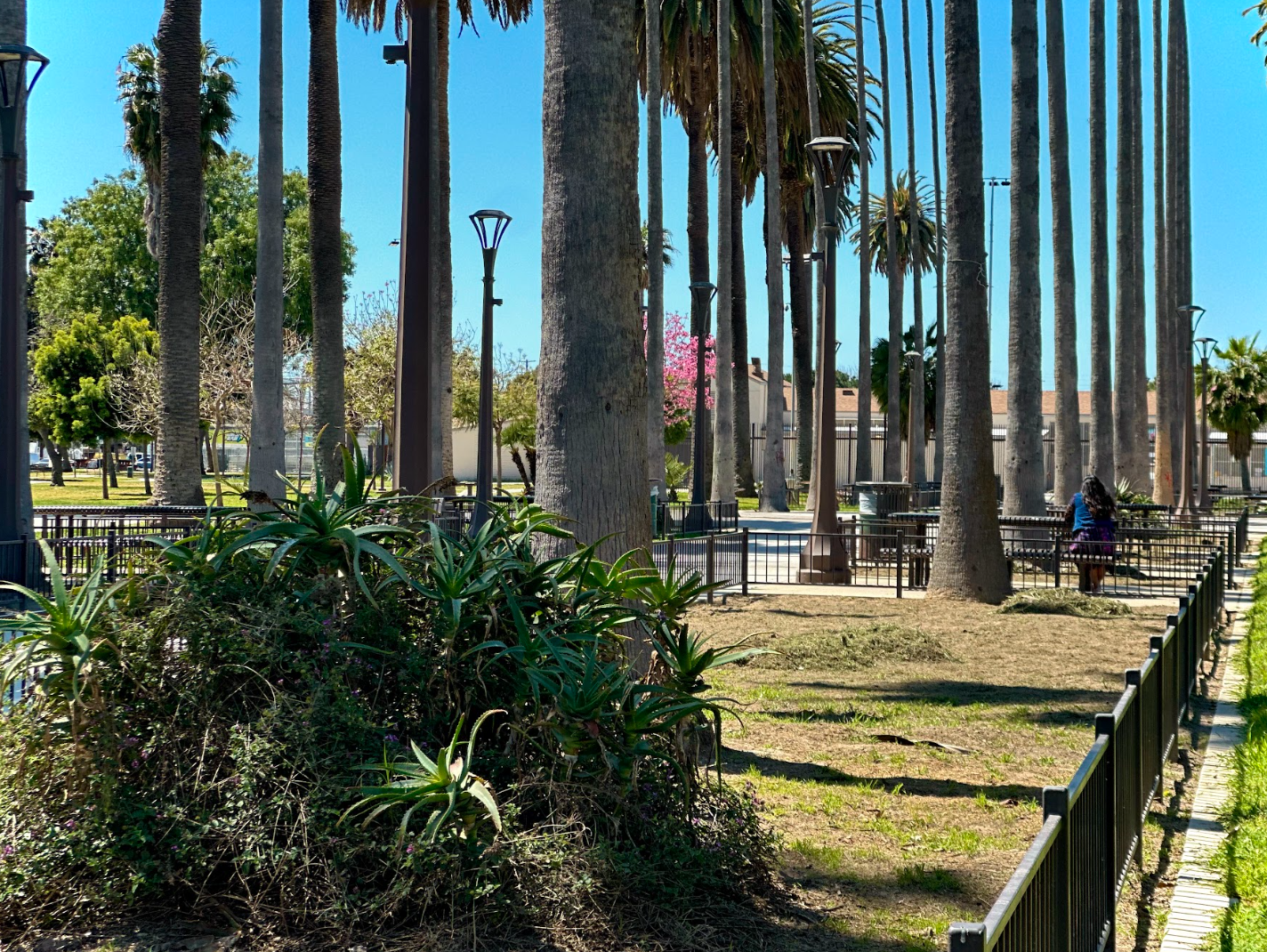
From a distance, Maria L. sits in the sun on the park benches. (Photo by Brenda Verano)
The relationship between access to parks and life expectancy are closely linked. Park deserts can have disastrous effects on residents as well as wildlife, as stated by a study conducted by the Prevention Institute in partnership with University of California, Los Angeles , the National Health Foundation, Community Coalition, Esperanza Community Housing Corporation and the Social Justice Learning Institute.
According to the research, South Central L.A. is considered to have “high park need” and “very high park need” neighborhoods, with an average of 1.6 and 0.7 acres of parkland per 1,000 residents, in comparison to the L.A. countywide average, which is 3.3 acres of parkland per 1,000 residents. The median life expectancy in South L.A. is 77 years, well below the level for the county as a whole. About 15 miles away, in the community of Beverly Hills, the life expectancy is about 90 years, 13 years higher.
South Central residents have been asking for more investment in parks and recreational facilities. In 2018, the 18.25-acre park went through a multi-million renovation, which allocated funding for the improvement of its gym, swimming pool, basketball and tennis courts, baseball diamond, outdoor stage, fitness area, picnic tables and children’s play area.
Despite the recent investments, the park has also been widely known for its gang and chrome activity, which the community says has been a direct effect of years of disinvestment and neglect.
In previous years, the Los Angeles Police Department identified the park as an area where gang activity—specifically from the Avalon Gangster Crips, Broadway Gangster Crips and 52nd Street Playboys—has been observed.
“The problem was scanned and revealed that this park, like many others in urban America, had slowly been neglected and overrun by criminal activity that revolved around gangs, narcotics and quality of life issues,” states the LAPD. “The analysis of the problem at the park was conducted by reviewing data, meeting with officers and receiving input from local community representatives and park staff members.”
Despite this, the community recognized the park as a long-standing historical entity of South Central L.A.
As one of the oldest parks in the city, South L.A. Park continues to be home to local residents, wildlife, street vendors, youth and all the great things that make up Los Angeles.
EDITORS NOTE: This article was published through the Bezos Fellowship grant provided by the Ethnic Media Services, which recently changed its name to American Community Media. The article was written by Brenda Fernanda Verano, an award-winning journalist who reports for CALÓ News, a local non-profit newsroom focusing on the Latin American community of Los Angeles.
Myanmar
LGBTQ+ advocacy group joins Myanmar earthquake relief effort
March 28 quake killed thousands, devastated country’s second-largest city

A powerful earthquake that rocked Myanmar on March 28 unleashed devastation across the central part of the country.
The U.S. Geological Survey measured the quake at 7.7, and pinpointing its epicenter roughly 10 miles west of Mandalay, the country’s second-largest city. A 6.4-magnitude aftershock jolted the area 12 minutes later, compounding the destruction and deepening the crisis for a nation already strained by conflict.
The earthquake struck with terrifying intensity near its epicenter, wreaking havoc on Mandalay and the nearby city of Sagaing.
Mandalay, a bustling city of approximately 1.5 million residents, bore the brunt of the destruction. Among the most striking losses was the 12-story Sky Villa Condominium, which collapsed, leaving scores trapped beneath the wreckage. Rescue workers scrambled to pull survivors from the rubble, but the rising death toll underscored the tragedy’s magnitude.
In Sagaing, which is located closer to the epicenter, more than 70 percent of buildings sustained damage. The Ava Bridge, an essential artery spanning the Irrawaddy River, collapsed, cutting off a critical connection to Mandalay. The earthquake’s shallow depth of less than seven miles amplified its power, reducing homes, temples, and schools to rubble.
The earthquake’s death toll continues to climb, with at least 3,649 confirmed dead, more than 5,000 injured, and approximately 145 people missing. Amid the widespread devastation, questions loom about the impact on vulnerable populations. The Los Angeles Blade reached out to Colors Rainbow, an organization advocating for LGBTQ+ rights in Myanmar, to understand how the crisis has affected one of the nation’s most marginalized communities.
Colors Rainbow Executive Director Hla Myat Tun spoke about how his organization is working to address the crisis faced by Myanmar’s LGBTQ+ community in the aftermath of the earthquake.
Colors Rainbow has implemented a system of multipurpose cash transfers, directing funds to local LGBTQ+ partner organizations. These grassroots partners, in turn, provide essential support to affected individuals that includes emergency cash assistance, food, non-food items, clean water, and basic emotional support tailored to the immediate needs of their communities.
“We estimate that around 500–800 LGBTQ individuals have been impacted in the affected areas, particularly in Mandalay Region, Sagaing Region, and southern Shan state,” said Hla Myat Tun. “So far, we have been able to directly assist around 80–100 LGBTQ individuals.”
Hla Myat Tun told the Blade that Colors Rainbow is actively gathering data to assess the specific challenges that LGBTQ+ people are facing in the aftermath of the earthquake.
Preliminary observations, he noted, point to heightened vulnerability among LGBTQ+ people, driven by social exclusion and limited access to mainstream humanitarian aid. Hla Myat Tun, however, emphasized more comprehensive information is necessary to fully understand the scope of their needs and vulnerabilities in this crisis.
“We are partnering with international LGBTQ and feminist organizations that focus on displaced communities,” said Hla Myat Tun. “These partners provide emergency funds, and we coordinate with local LGBTQ groups to deliver aid directly to affected individuals on the ground.”
Addressing reports of military restrictions on humanitarian aid, Hla Myat Tun explained how Colors Rainbow is managing to reach LGBTQ+ people who are in conflict zones and areas the military junta controls. Hla Myat Tun highlighted the importance of the organization’s trusted local LGBTQ+ partners, who are embedded in these regions. Their presence and established networks, he said, are vital in navigating restricted areas and ensuring that aid reaches the LGBTQ+ people who are most in need.
Hla Myat Tun also provided insight into how Colors Rainbow is tailoring its relief efforts to meet the LGBTQ+ community’s specific needs.
He said his organization is gathering information directly from LGBTQ+ people through close coordination with its local partners, relying on both formal and informal communication channels. Hla Myat Tun told the Blade his team conducts daily check-ins via quick telephone calls, ensuring a continuous flow of information to guide their response efforts despite limited internet access, electricity and other challenges.
“Our approach is collaborative — we set strategies and share responsibilities to respond flexibly and safely, based on the rapidly changing local context,” he said. “Personal stories are being documented, but for security reasons, we are cautious about sharing them publicly.”
When asked whether staff or volunteers had harassment, discrimination, or violence while delivering aid — a concern given the precarious legal and social climate for LGBTQ+ people in Myanmar — Hla Myat Tun said there have been no reported incidents thus far.
“So far, we haven’t received any reports from our staff or local partners about harassment or violence while delivering aid,” he noted, emphasizing Colors Rainbow remains vigilant and has implemented robust safety protocols to protect all involved.
Colors Rainbow relies primarily on funding from international LGBTQ+-focused partners. He noted, however, humanitarian funding specifically dedicated to LGBTQ+ communities remains vastly under-resourced, relative to the pressing needs on the ground. Hla Myat Tun said this shortfall severely limits the scale and reach of Colors Rainbow’s efforts.
“While Myanmar’s legal framework remains outdated, societal attitudes — especially during the civilian government — have shown signs of progress,” said Hla Myat Tun. “We have seen positive change thanks to the work of local LGBTQ organizations.”
“In the current crisis, many communities are working together despite legal barriers. However, in areas without LGBTQ-led organizations, inclusive humanitarian responses are still lacking,” he added. “There’s an urgent need for international humanitarian actors to understand and implement LGBTQ-inclusive practices in Myanmar.”
When asked about long-term strategies to support the recovery and resilience of LGBTQ+ communities as Myanmar rebuilds, Hla Myat Tun affirmed Colors Rainbow is deeply committed to fostering resilience. The organization’s initiatives include leadership development, community empowerment through training and workshops, sub-granting programs, and organizational development support. He also highlighted Colors Rainbow’s advocacy for LGBTQ+-inclusive policies and collaboration with ethnic groups to promote an inclusive federal democracy, and specifically thanked Outright International, a global LGBTQ+ and intersex rights group, for “amplifying our work.
“This kind of international attention shines a spotlight on the challenges LGBTQ communities in Myanmar are facing and helps open doors for more support,” Hla Myat Tun told the Blade. “It also boosts visibility and solidarity, both locally and globally, which we deeply appreciate.”
Arts & Entertainment
LA Opera brings back Pride Night with a production of ‘Ainadamar’
Pride Night returns at the LA Opera

LA Opera is bringing back its Pride Night on Wednesday May 7, in partnership with the Opera League of Los Angeles.
LGBTQ members and allies will come together for Pride Night to indulge in a performance of “Ainadamar,” at the Dorothy Chandler Pavillion. The discounted tickets for Pride Night include access to a complimentary post-show party at Vespaio hosted by the Opera League of Los Angeles, featuring Cal-Italian bites from Chef Agostino Sciandri.
“Ainadamar” is a tribute to Spanish poet and queer icon, Federico García Lorca.
“This season, we celebrate with ‘Ainadamar,’ a powerful tribute to Spanish poet and queer icon Federico García Lorca. These pairings matter. They highlight that opera is a living, evolving art form—one that speaks to all people and reflects the diversity of the world we live in,” said Christopher Koelsch, president and CEO of LA Opera.
The central plot of “Ainadamar,” which is the Arabic meaning for ‘fountain of tears,’ follows Ana María Martínez as Margarita Xirgu, an actress who spent half of her career portraying Mariana Pineda, who was a 19th-century Spanish liberalist heroine, in Lorca’s play. Pineda was a political martyr who was executed for embroidering a flag with the slogan “Equality, Freedom and Law,” in protest of the absolutist Spanish regime.
The production, running at approximately one hour and 20 minutes, sets the stage with a throwback, recounting Lorca’s life and his last days in the Spanish Civil War.
“At the heart of our Pride Night celebration is the belief that everyone should feel seen onstage and off. Opera is a space for community and belonging, where our audiences can recognize themselves not only among fellow attendees, but also in our artists, our music and the stories we tell,” said Koelsch.
This major company premiere, led by resident conductor Lina Gonzáles-Granados, is sung in Spanish, with English and Spanish subtitles. Grammy-winning composer Osvaldo Golijov produces the dramatic, flamenco-inspired score that meets the poignant libretto by David Henry Hwang.
During the COVID-19 shutdowns, live performances at the LA Opera were put on hold and the journey to bring back Pride Night, among many other in-person performances, was a struggle filled with many moving parts.
“COVID-19 suspended live performances across the board and during our return season we were navigating the different timelines for audiences returning to live theater. It was very much a matter of listening to our community and learning what had changed for them as well as us: some opted for livestream options, others preferred only outdoor events, and so on,” said Koelsch. “Once we found our stride, we were excited to bring back Pride Night the following season during ‘The Marriage of Figaro.’”
This year the LA Opera is celebrating their 40th anniversary by launching their 40th Anniversary Campaign to raise resources needed to continue funding their organization.The show opens on Saturday, April 26 and runs through May 18. Purchase tickets by clicking here.
-

 Arts & Entertainment24 hours ago
Arts & Entertainment24 hours ago2025 Best of LGBTQ LA Finalist Voting
-

 opinions4 days ago
opinions4 days agoOver 36,000 Angelenos unite for ‘Fighting the Oligarchy’ rally
-

 Congress4 days ago
Congress4 days agoEXCLUSIVE: Garcia demands answers on deportation of gay Venezuelan asylum seeker
-

 Books3 days ago
Books3 days ago‘Pronoun Trouble’ reminds us that punctuation matters
-

 Theater4 days ago
Theater4 days ago‘The Broadway Cage Match’ ready to rumble at WeHo’s Musical Mondays
-
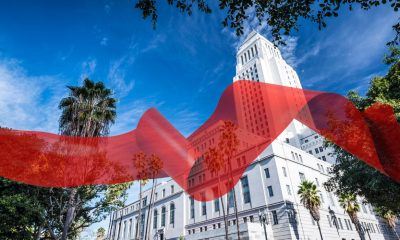
 Local1 day ago
Local1 day ago‘Housing Now!’: Advocates plan to wrap City Hall in red tape
-

 Features4 days ago
Features4 days agoNew mayor Chelsea Byers, hopes to make WeHo a model city for others to follow
-

 The Vatican1 day ago
The Vatican1 day agoPope Francis dies at 88
-

 Autos1 day ago
Autos1 day agoSporty sedans: BMW 530i xDrive, Mercedes AMG CLA 3
-

 Bars & Parties2 hours ago
Bars & Parties2 hours agoRocco’s 2.0 is looking to the past to celebrate the future


